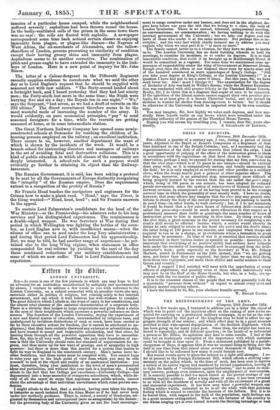DRILL OF RECRUITS.
Florence, 26th December 1854. .Sra—About a quarter of a century ago, I was, during a period of three years, Adjutant to the Depot or Reserve Companies of a Regiment at that time stationed in one of the British Colonies ; and, as I necessarily had the superintendence of the drill of all the recruits that joined the corps, I had a good opportunity of judging of the effect of the instruction given to them in accordance with the regulations on that head then in force. With this observation, perhaps I may be excused for stating that my firm conviction is, that the slow step—which is of 75 paces in one minute—should he entirely done away with, as it is comparatively useless, and totally unnww.,..ry in the field; for it is only employ ed at reviews and other parades as a military show, when the troops march .past a general or other superior officer. The slow step, moreover, is an unnatural step, consequently more difficult of being properly learned by the recruit than the one called the-quickstep; which, being of 108 paces in one minute, has been adopted for ordinary parade movements, since the system of manceuvres of General Dundee un- derwent revision, in consequence of its having been proved to be the average natural time in which the generality of men usually walk. I have no doubt, however, that some officers may imagine that the slow step may greatly con- tribute to steady the body of the recruit preparatory to his learning to march in quick time—in other words, to walk correctly ; but, if I be not mistaken, it would be found that a few extra hours of balance-step drill—commonly called the goose-step—would be much more efficacious in that respect as a preliminary measure than treble or quadruple the same number of hours of instruction given to him in marching in slow time. By doing away with the slow time, a great economy in the period necessary for completing a re- cruit's drill would be effected : besides which, a soldier would thereby in future be only obliged to retain in his head the quick and the double time; the latter being of 150 paces in one minute, and employed when troops are required to run as in a charge, or in evolutions where a formation in great haste may be necessary. In time of war it is essential that recruits should be instructed in their various duties as speedily as possible : therefore it is important that everything a no positive utility that soldiers have hitherto been under the necessity of learning should now be expunged from the drill- instructor's book ; more especially as the Secretary at War, Mr. Sidney Herbert, stated in Parliament on the 12th instant, that "we are getting men, not faster than they are required, but faster than we can drill them, form them into regiments, and make them skilful and useful soldiers to their Queen and country." What I suggest I feel satisfied will meet with the approbation of many officers of experience, and possibly even of those officers individually who may now be on the Staff at the Horse Guards, but who, as a body, are op- pressed with the vis inertiai of public office. It is to the educated classes of the people that we must generally look for a seasonable "pressure from without" in regard to almost every civil and military matter requiring reform.
I have the honour to be, Sir, your obedient humble servant,
W. BaYAri COOKE.






































 Previous page
Previous page